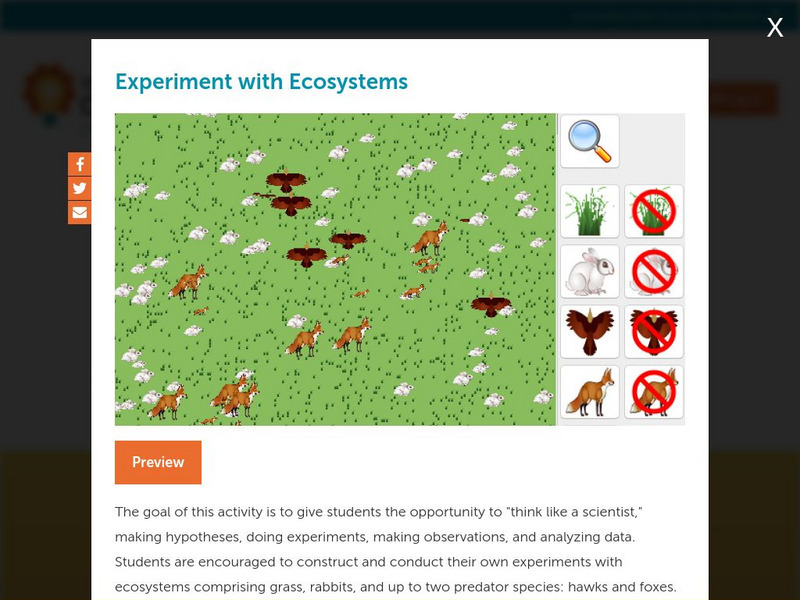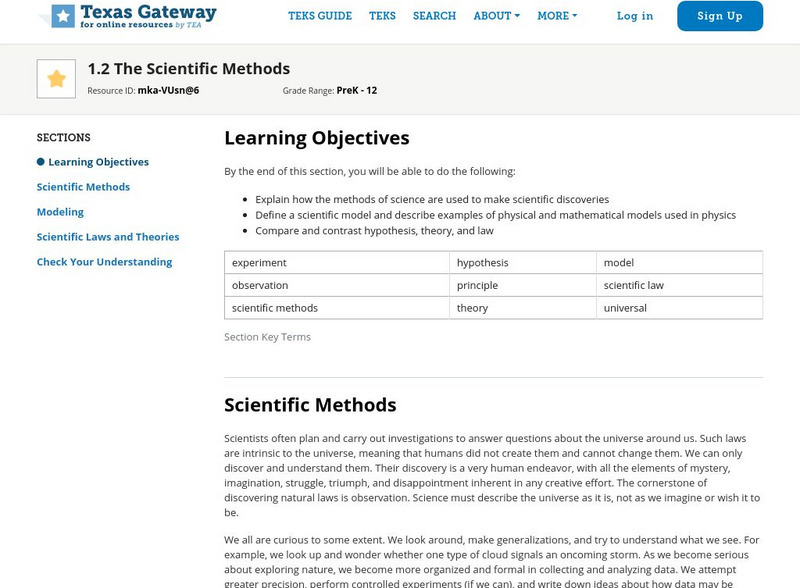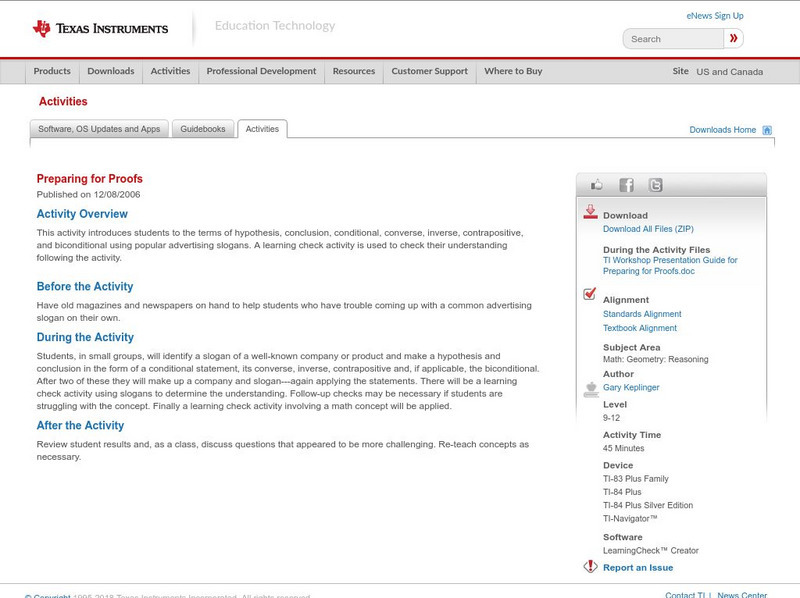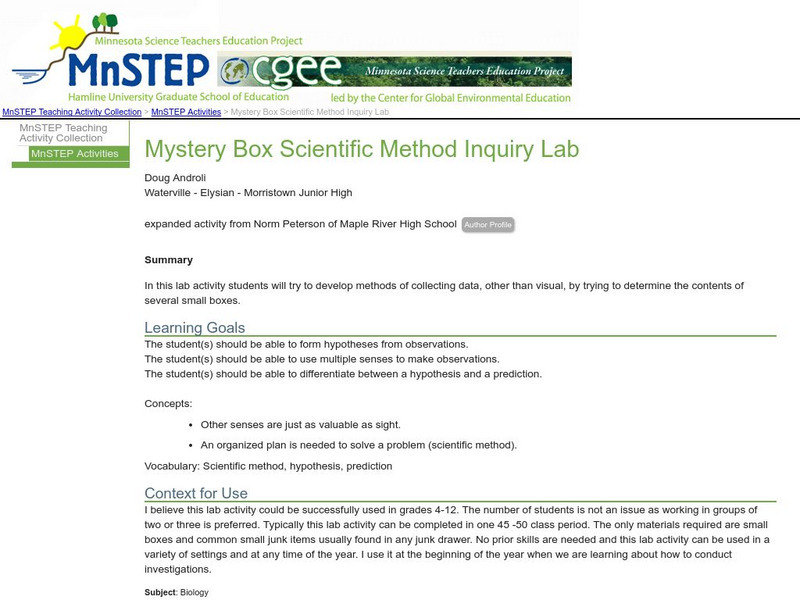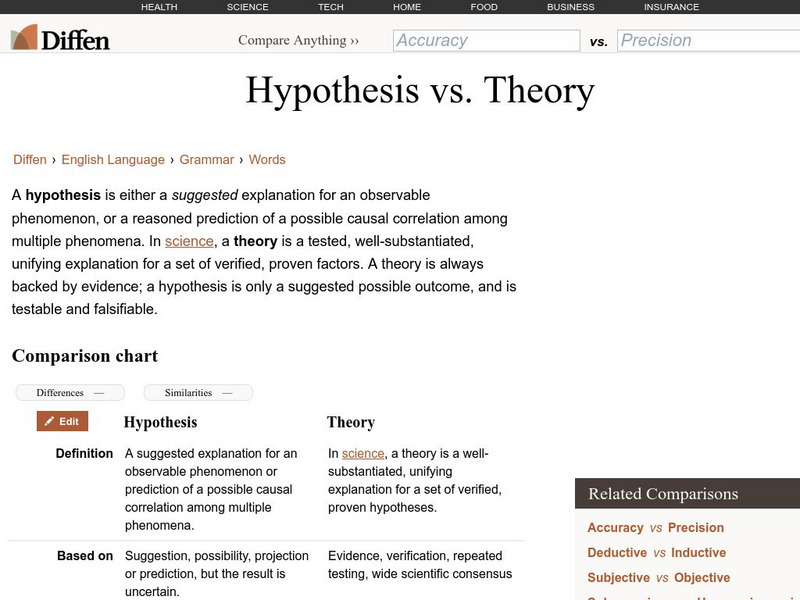TeachEngineering
Teach Engineering: Students as Scientists
This curricular unit contains two lessons that let students actually do the work of scientists as they design their own experiments to answer questions they generate. In the first lesson and its associated activity, students conduct a...
Pennsylvania State University
Penn State Lehigh Valley: Scientific Investigation
This site presents a general overview of scientific investigation. Content explores what scientific investigation is, as well as the scientific method (the guidelines followed by all scientists).
University of Arizona
Environmental Tobacco Smoke and Lung Development Activity
An interactive activity designed for you understand the scientific method and how to analyze your data. A step-by-step and personalized experiment geared toward the topic of toxicology.
Texas Education Agency
Texas Gateway: Theories
Given laboratory investigation scenarios, students will distinguish between scientific hypotheses and scientific theories.
Center for Innovation in Engineering and Science Education, Stevens Institute of Technology
Ciese Collaborative Projects: Down the Drain: How Much Water Do You Use?
How much water do you use everyday? Find out in this engaging investigation, where you compare your water usage with your classmates and other people around the world. An exploration filled with lots of math and science that students are...
Other
Hong Kong Polytech: Functions in Academic Writing
Provides a wealth of interactive exercises dealing mainly with the structuring of sentences in different kinds of academic writing.
Concord Consortium
Concord Consortium: Stem Resources: Experiment With Ecosystems
Learn what happens to different populations of organisms as their ecosystem changes. Design your own experiment and make your own guesses with what the result will be with this virtual ecosystem. Also experiment with producer/consumer...
Texas Education Agency
Texas Gateway: Physics: The Scientific Methods
By the end of this section, you will be able to explain how the methods of science are used to make scientific discoveries; define a scientific model and describe examples of physical and mathematical models used in physics; and compare...
CK-12 Foundation
Ck 12: Scientific Inquiry
[Free Registration/Login may be required to access all resource tools.] Tutorial provides an understanding of the scientific method and how it is used to study the world around us. Students will learn about scientific inquiry and be able...
Indiana University
Indiana University: Science vs. Non Science
This mini-lesson at the Evolution and Nature of Science Institute site from Indiana University provides a criteria by which students can evaluate an idea or explanation for scientific credibility.
Brigham Young University
Byu: Mark Davies: Scientific Methods and Empiricism
These college professor's notes give an overview of empiricism as the cornerstone of the scientific method. It is the approach he uses to analyze linguistic phenomena in class.
PBS
Pbs Learning Media: A Colorful Hypothesis
Use "Dinosaur Train" to illustrate and excite your students about creating a hypothesis. Website includes a video of "Dinosaur Train", a lesson plan, and student's handout. Lesson plan includes a lab where students can practice making...
University of Washington
Univ. Of Washington: Successful Science Far Projects
This competent site features a thorough and detailed description of the steps needed to produce a successful science fair project. Other helpful science fair web pages can be found on this site.
Texas Instruments
Texas Instruments: Preparing for Proofs
This activity introduces students to the terms of hypothesis, conclusion, conditional, converse, inverse, contrapositive, and biconditional using popular advertising slogans. A learning check activity is used to check their understanding...
University of Southern California
California State Science Fair: What Makes a Good Science Fair Project?
A good first step to read. This set of recommendations or advice comes from the California State Science Fair Committee. Read carefully the first three paragraphs and the "Students are advised" paragraph.
Science Education Resource Center at Carleton College
Serc: Mystery Box Scientific Method Inquiry Lab
In this activity, students will use their senses to form hypotheses from observations. They will develop methods of collecting data, other than visual, by trying to determine the contents of several small boxes and should be able to...
Science Education Resource Center at Carleton College
Serc: Candle Drop
By using this discrepant event, students will be guided through an investigation using a burning candle in a jar. The teacher will hold a burning candle in a jar over his/her head. When dropped, the candle will extinguish when caught....
Science Education Resource Center at Carleton College
Serc: Bubbling Blobs
In this chemistry lab, young scholars investigate how oil and water don't mix. They will work on their observation skills and their ability to follow directions to ensure they get the correct results. Students can then develop a new,...
Ministry of Education and Universities of the Region of Murcia (Spain)
Ministerio De Educacion Y Ciencia: Teoremas De Bolzano Y De Weierstrass
In Spanish. In this interactive unit learn how to understand the concept of hypothesis and thesis and some important applications of the Bolzano-Weierstrass theorem.
Wisconsin Response to Intervention Center
Wisconsin Rt I Center: Column Notes [Pdf]
Teachers will learn about the Column Notes graphic organizer, a tool that will help students analyze and synthesize what is viewed read, viewed, or heard. Reproducible Column Notes are provided.
TED Talks
Ted: Ted Ed: Can You Solve This?
In this video, Veritasium asks people to try and figure out the rules of a pattern presented. This video teaches us about the scientific method and how our preconceived notions can affect how we discover new information. [4:43]
PBS
Pbs Teachers: Runaway Universe
Use this activity to model how scientists use indirect observations to define problems that are not directly measurable.
Science Buddies
Science Buddies: Scientific Method Conclusion
The conclusion of a science experiment summarizes how your results supported or contradicted your hypothesis. See a sample of a conclusion and find out what makes a good conclusion.








